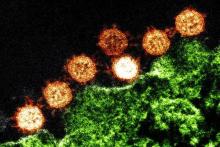
At the onset of the pandemic, Kampmann lab members Ruilin Tian, Avi Samelson, Xiaoyan Guo, Merissa Chen and Gokul Ramadoss decided that they wanted to leverage the lab's CRISPR-based screening platform to uncover host factors for SARS-CoV-2 infection, which are potential therapeutic targets for COVID-19.
We found that inhibition of BRD2 reduces levels of ACE2, the receptor for SARS-CoV2 on the surface of human cells. In collaboration with the Vignuzzi and Chakrabarti labs at the Institut Pasteur and the TenOever lab at NYU, we found that inhibition of BRD2 using drugs currently in clinical trials for cancer blocks SARS-CoV2 infection in human primary nasal epithelial cells and in a hamster model of COVID-19. However we also found that BRD2 inhibition suppresses the host interferon response; therefore, more work is needed to evaluate the therapeutic potential of BRD2 inhibition. Other collaborators included the Wells, Weissman and Conklin labs at UCSF, and Synthego.
The UCSF press release describing this work is here.
These results were published today in Nature Cell Biology:
Avi J. Samelson, Quang Dinh Tran, Rémy Robinot, Lucia Carrau, Veronica V. Rezelj, Alice Mac Kain, Merissa Chen, Gokul N. Ramadoss, Xiaoyan Guo, Shion A. Lim, Irene Lui, James K. Nuñez, Sarah J. Rockwood, Jianhui Wang, Na Liu, Jared Carlson-Stevermer, Jennifer Oki, Travis Maures, Kevin Holden, Jonathan S. Weissman, James A. Wells, Bruce R. Conklin, Benjamin R. TenOever, Lisa A. Chakrabarti, Marco Vignuzzi, Ruilin Tian* & Martin Kampmann*
BRD2 inhibition blocks SARS-CoV-2 infection by reducing transcription of the host cell receptor ACE2
Nature Cell Biology (2022). https://doi.org/10.1038/s41556-021-00821-8
Free access here, bioRxiv preprint here.
